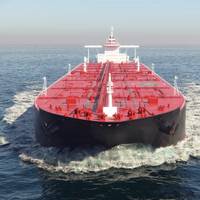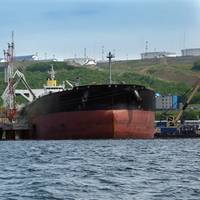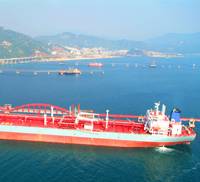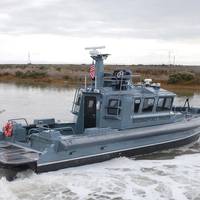Iran building oil pipeline to terminal outside Gulf

Iran is building a $1.8 billion oil pipeline to its port of Jask outside the mouth of the Gulf, the country's oil minister said, as part of plans to protect its exports against potential problems in the region and to boost shipments of Caspian oil.Iran has been planning since at least 2012 to set up the terminal on the Gulf of Oman, just outside the Strait of Hormuz.Tehran has threatened to block the vital Gulf oil shipping route during its standoff with the United States, after Washington last year withdrew from Iran's 2015 nuclear deal with world powers and reimposed sanctions…
Full Tanks & Tankers: A Stubborn Oil Glut Despite OPEC Cuts

After the first OPEC oil production cut in eight years took effect in January, oil traders from Houston to Singapore started emptying millions of barrels of crude from storage tanks. Investors hailed the drawdowns as the beginning of the end of a two-year supply glut - raising hopes for steadily rising per-barrel prices. It hasn't worked out that way. Now, many of those same storage tanks are filling back up or draining more slowly than investors and oil firms had expected, according…
S.Korea Plans to Boost Iran Oil Imports
South Korea plans to boost imports of Iranian oil, especially condensate, this year to meet growing demand after sanctions on the Islamic nation were lifted in January. The world's fifth largest importer of crude is also a big buyer of condensate, a super light oil that can be processed into fuels and petrochemicals. Iran's return would help ease tight condensate supply in a market dominated by fellow OPEC producer Qatar. "We will increase oil and natural gas (liquids) imports from Iran, especially Iranian condensate," South Korea's trade and energy ministry said on Tuesday. Iran is exporting 100,000 barrels of oil a day to South Korea, one of its main crude customers, and hopes to double that figure by the end of 2016, Oil Minister Bijan Zanganeh was quoted as saying on Monday.
Tianjin Resumes Commodity Port Ops
Oil, gas and iron ore imports resume after disruptions; Strategic oil reserves in the region not affected. Many operations have resumed at China's Tianjin port, trade sources said, after explosions last week that killed more than 100 people and disrupted business at what is an important oil, gas and bulk import harbour for Asia's biggest economy. The explosions on Aug. 12 led to the disruption of all chemical and oil tanker discharges at the port, and imports of iron ore were also affected. But shipping data from Reuters on Monday showed that tankers were discharging again, with traders and shippers confirming that operations had restarted over the weekend. Port officials were not immediately available for comment.
First Supertanker Docks at Vopak-Dialog Terminal
A supertanker carrying about 1 million barrels of Middle East crude docked on Monday at a terminal jointly run by Vopak and Dialog Group in Malaysia, the companies said. The arrival of tanker MT Mesdar marked the start of operations at southeast Asia's first commercial crude oil tank farm. The tanker had been chartered by CSSA, the shipping arm of French oil major Total, and it loaded the crude cargo at Fujairah in the United Arab Emirates in February, Reuters shipping data showed. Located in Pengerang, in the southern state of Johor, just across the Johor Strait from the Singapore trading hub, the site can hold 420,000 cubic metres of crude (2.6 million barrels) and also offers blending and distribution services.
Brightoil Reports Steady Growth in Interim Results

Brightoil Petroleum (Holdings) Limited announced its interim results for the six months ended December 31, 2014, reporting steady growth over the period. During the period, profit attributable to the owners of the group increased 3% year-on-year to HK$561 million. Basic earnings per share amounted to 6.41 HK cents, up 3% from a year ago. Total revenue climbed 11% from HK$40.3 billion in 1HFY2014 toHK$44.9 billion for the period as the twin-engines business model (upstream and mid-downstream businesses) enabled the group to secure steady growth amid volatile oil prices.
Moose Boats Delivers Two Patrol Vessels

Moose Boats, an aluminum boat designer and manufacturer in the San Francisco Bay Area announced the delivery of two patrol boats in late 2013. Moose Boats delivered a new M1-44 Catamaran Patrol Boat to Bridgeport Police Department on Long Island Sound. The M1-44 all-aluminum catamaran is powered by twin Cummins QSC8.3 600hp marine turbo diesel engines coupled via TwinDisc MG5075SC transmissions to twin Hamilton 322 water-jets with Hamilton Blue Arrow Controls. The vessel named “John Jack Flynn III” features a generous fully enclosed cabin complete with shock mitigating seats…
Drydocks World Chairman to Participate at Mare Forum

Drydocks World and Maritime World, one of the largest and most diversified shipyards in the world, announced that Chairman Khamis Juma Buamim, will participate in the Mare Forum, Rome, Italy where he will deliver a keynote address. The theme of the forum “Quo Vadis” (Where are you going?) is significant to the issues that will be raised during his address. This high profile annual event attracts a wide participation representing a global and diverse section of the maritime & offshore community including ship-owners…
Brightoil Petroleum Transforms
Brightoil Petroleum (Holdings) Limited, the largest service provider of marine bunkering in Shenzhen Port and its surrounding areas, announced its interim results as at 31 December 2008. For the six months ended 31 December 2008, the group's revenue surged to HK$2,942,195,000, representing a skyrocketing increase of approximately 237 times as compared to the corresponding period last year. Gross profit posted a year-on-year growth of 1,528% from HK$12,004,000 to HK$195,444,000. Profit attributable to shareholders went up significantly by 232% to approximately HK$168,082,000 and earnings per share jumped by 229% to 13.8 HK cents when compared to the same period of the previous year.
WA Oil Transfer Rules Protect Waters
In September 2006, state lawmakers directed Washington Department of Ecology (Ecology) to adopt stringent oil transfer rules after 4,700 gallons of heavy fuel oil spilled during an oil transfer operation at Chevron-Texaco's Richmond Beach fuel terminal in December 2003. Swift currents drove the oil ashore on the Suquamish Tribe shellfish beds at Doe-kag-wats beach and salt marsh at Indianola in Kitsap County. In 2008, nearly 15 billion gallons of oil were transferred over Washington waters by ship, fueling facility, tank truck or rail, according to Ecology reports. That equals 1.7 million gallons an hour. Since the rules went into effect, Ecology has seen reductions in the amount of oil spilled. In 2008, only about 158 gallons were spilled to Washington waters during fuel transfers.
SMP Expands Ops in Mobile, Ala.
Shell Marine Products (SMP), the global supplier of marine fuels, lubricants and services, announced the start-up of its bunker fuels operations in Mobile, Ala. The company already has a strong business base in the USA Gulf Coast region, supplying bunker fuels and lubricants, and has expanded its geographic coverage to offer fuel oil, gas oil and lubricants to customers in Mobile. Shell Marine Products has fuel oil storage facilities in Mobile Harbor located at Radcliff/Economy Terminal. The company has also secured privileged access to the only double-hull bunker barge in the region to facilitate all fuel oil deliveries. With over 1,000 ships calling Mobile harbor each year, the region is an interesting bunkering market.
Unannounced Spill Drills Exceed Expectations
Four oil-handling facilities in Washington had unannounced spill drills sprung on them last week by the state Department of Ecology and all four passed. The four facilities that participated in the simultaneous drills were the BP Cherry Point Refinery in Ferndale, Shore Terminal in Tacoma, Tesoro Terminal in Port Angeles and ConocoPhillips-Yellowstone Pipeline in Spokane. Beginning around 10 a.m. on Wednesday, March 9, staff from Ecology, the U.S. Coast Guard and the federal Environmental Protection Agency arrived at the facilities and presented scenarios that called for the companies to notify appropriate officials, organize a command center, and assess what type of spill response was needed to protect the public, the environment and workers.
Titan Petrochemicals Completes Shipbuilding Transaction
According to reports, Titan Petrochemicals Group has completed the acquisition of a shipyard from its controlling shareholder. The transaction was priced at a significant valuation discount to other Chinese shipyards based on the current order book and expected future earnings, which suggests the injection should be very favorable to Titan. Part of the shipyard project – including the high-margin ship repair facility -is still at the development stage, however, which means the acquisition is not without risks. Acknowledging these risks, the payment has been structured to account for the fact that a lot of the earnings potential is based on what comes on stream in 2008-2010.
Ship Fined for Failure to Have Oil Spill Readiness Plan
The Washington Department of Ecology (Ecology) has levied an $8,500 fine to the Greek shipping firm Marmaras Navigation Co. Ltd. for operating a cargo vessel in Washington waters without a state-approved oil spill readiness plan. The penalty against Marmaras Navigation marks the first time Ecology has levied a fine under its new oil spill contingency plan rule adopted in October 2006. Ecology requires that cargo and passenger ships, tank vessels, oil storage facilities and pipeline companies demonstrate that they can mount an effective, timely response if they spill oil. Under the rule, the vessel must either have their own approved spill readiness plan or be enrolled in one of the two non-profit organizations with approved plans that cover vessels in Washington.
Washington State – Oil Transfer Requirement Training
Washington companies and operators that transfer oil over water to non-recreational vessels got some unanticipated help this month on successfully complying with the Department of Ecology (Ecology) oil transfer rules adopted in September 2006. On March 8 and 15, Ecology staff made technical assistance visits to 65 oil transfer locations across the state. Since different requirements are being phased in during the rule's first year, the agency's "Answers to Transfers" campaign was designed to answer questions and provide guidance about how the rule will affect different types of regulated facilities. The new regulations describe how oil must be transferred over water to tank vessels…
Washington State Bolsters Spill Prevention and Response
In anticipation of adopting new safeguards regarding oil transfers over water and early spill response requirements, the Department of Ecology (Ecology) has added new spill prevention inspectors, a spill responder and a contingency plan reviewer to oversee mobile oil facilities. For the first time, Ecology is stationing a vessel and oil-handling facility inspector and a hazardous material responder in Bellingham. Both positions will focus on prevention and response activities in Island, San Juan, Skagit and Whatcom counties. There are three oil refineries and two oil pipelines in the region that generate heavy ship traffic in northwest Washington. To prevent oil spills in the Puget Sound and lower Columbia River, the department has added four inspectors.
Ecology Proposes Spill Prevention and Response Readiness Rules
Washington waters and to improve response readiness. trucks and rail cars. facility and vessel operators who transfer oil to or from vessels. practices to prevent spills. required to deploy oil-spill containment boom prior to transferring oil. activities. that they can mount an effective, timely response if they spill oil. spill readiness drills.









